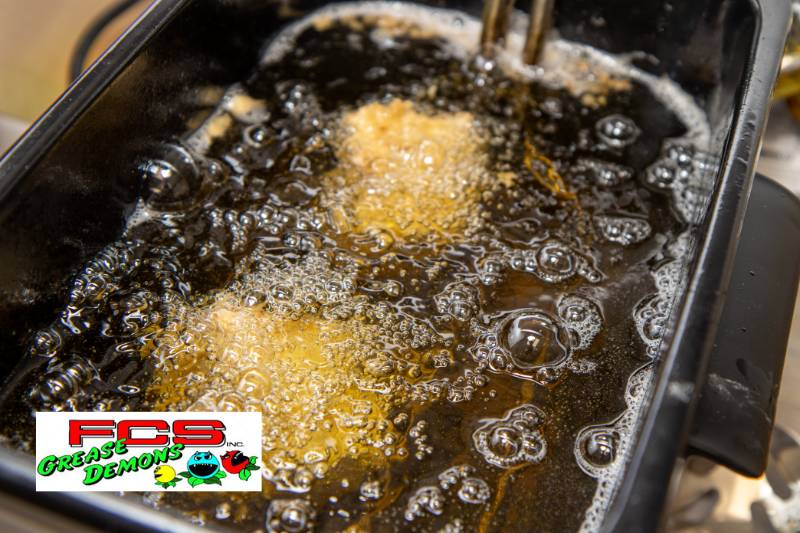Benefits of Using Recycled Cooking Oil: A Greener Approach to Waste Management
In today’s world, sustainability and eco-friendly practices have become crucial aspects of both business operations and everyday life. One of the most effective ways to contribute to environmental conservation is through recycling and repurposing materials that would otherwise go to waste. One such material that often gets overlooked is used cooking oil. While improper disposal of used cooking oil can lead to environmental harm, cooking oil recycling offers a greener solution with numerous benefits for businesses, individuals, and the planet.
In this blog post, we’ll explore the many benefits of used cooking oil recycling, how companies like FCS, Inc. are leading the charge in responsible oil disposal, and why businesses and households should consider making this simple but impactful switch.
What Is Used Cooking Oil Recycling?
Before diving into the benefits, let’s clarify what used cooking oil recycling involves. Used cooking oil is the oil left over after frying, baking, or sautéing food. This oil can come from household kitchens or large commercial establishments, such as restaurants and food processing plants. Rather than disposing of this oil by pouring it down the drain or throwing it in the trash—both of which have harmful environmental consequences—used cooking oil can be collected, processed, and recycled into valuable products such as biodiesel, animal feed, or industrial lubricants.
Companies like FCS, Inc. specialize in the collection and recycling of used cooking oil, ensuring that the oil is properly handled and converted into eco-friendly products.
1. Environmental Benefits of Cooking Oil Recycling
One of the most significant advantages of used cooking oil recycling is its positive impact on the environment. The improper disposal of used cooking oil can lead to clogged pipes, polluted water systems, and increased greenhouse gas emissions. Here’s how cooking oil recycling helps mitigate these environmental risks:
A. Preventing Water Pollution
When used cooking oil is poured down the drain, it can congeal and block pipes, leading to sewer overflows and contamination of local water systems. Even small amounts of oil can create a film on the surface of water, preventing oxygen from reaching aquatic plants and animals, which can severely disrupt ecosystems.
Cooking oil recycling prevents these harmful effects by ensuring that the oil is collected and processed responsibly, keeping waterways free from contamination.
B. Reducing Carbon Emissions
Another major environmental benefit of cooking oil recycling is its ability to reduce carbon emissions. Used cooking oil can be converted into biodiesel, a renewable and cleaner-burning fuel that produces fewer greenhouse gas emissions compared to traditional fossil fuels. Biodiesel made from used cooking oil helps reduce the demand for petroleum-based fuels, contributing to a more sustainable and eco-friendly energy solution.
By choosing to recycle used cooking oil, businesses and households can play a part in reducing their carbon footprint and promoting renewable energy sources.
C. Reducing Landfill Waste
When used cooking oil is discarded improperly, it often ends up in landfills, where it can take years to break down and may even contribute to the emission of harmful gases like methane. By recycling the oil, we reduce the amount of waste that goes to landfills, helping to preserve natural resources and reduce environmental degradation.
2. Economic Benefits of Cooking Oil Recycling
Aside from its environmental impact, used cooking oil recycling offers several economic benefits that make it an attractive option for businesses and individuals alike. Here’s how cooking oil recycling can provide financial advantages:
A. Reducing Waste Management Costs
For businesses such as restaurants, food manufacturers, and catering services, the disposal of used cooking oil can be costly, especially if it involves frequent trash collection or plumbing repairs due to clogged drains. By partnering with companies like FCS, Inc., businesses can save on waste management costs by having their used cooking oil collected and recycled on a regular basis.
Many cooking oil recycling programs offer free collection services, which help businesses reduce their waste management expenses while ensuring that their oil is disposed of responsibly.
B. Generating Revenue
In some cases, businesses that produce large quantities of used cooking oil can actually generate revenue by selling their oil to recycling companies. These companies, like FCS, Inc., purchase used cooking oil and repurpose it into biodiesel or other valuable products. For businesses that regularly produce significant amounts of used oil, this can become an additional revenue stream.
C. Supporting the Green Economy
By participating in cooking oil recycling, businesses contribute to the growth of the green economy. The demand for sustainable fuels, eco-friendly products, and renewable energy sources continues to rise, and recycled used cooking oil plays a critical role in meeting these demands. Investing in recycling initiatives supports local businesses and industries that are working to promote environmental sustainability.
3. Social and Brand Benefits of Cooking Oil Recycling
In addition to environmental and economic advantages, used cooking oil recycling provides social benefits, particularly for businesses that want to align with modern consumer values. Today’s consumers are more eco-conscious than ever, and businesses that demonstrate a commitment to sustainability can build stronger relationships with their customers and enhance their brand reputation.
A. Demonstrating Social Responsibility
By choosing to recycle used cooking oil, businesses can demonstrate their commitment to social responsibility and environmental stewardship. This not only sets a positive example for other businesses but also strengthens relationships with customers who prioritize sustainability in their purchasing decisions.
Many consumers are more likely to support businesses that are actively working to reduce their environmental impact. By promoting cooking oil recycling, companies can showcase their dedication to greener practices and attract eco-conscious customers.
B. Building Brand Loyalty
For businesses in the food and hospitality industry, sustainability can be a powerful tool for building brand loyalty. Offering transparency about your used cooking oil recycling efforts—whether through social media, marketing materials, or in-store promotions—can foster goodwill with customers and encourage repeat business.
Incorporating cooking oil recycling into your sustainability initiatives is an effective way to engage with your community, create positive brand associations, and establish your business as a leader in environmental responsibility.
C. Setting a Standard in Your Industry
As sustainability becomes an increasing priority for businesses across industries, adopting cooking oil recycling can help set your company apart from competitors. By making cooking oil recycling a core part of your business operations, you’ll not only reduce your environmental impact but also encourage others in your industry to follow suit.
Businesses that lead the way in sustainability can inspire positive change throughout their industry, helping to raise awareness about the importance of cooking oil recycling and other eco-friendly practices.
How FCS, Inc. Supports Used Cooking Oil Recycling
At FCS, Inc., we’re dedicated to providing efficient and environmentally responsible used cooking oil recycling services for businesses. We partner with restaurants, food service providers, and other commercial establishments to ensure that their used cooking oil is collected, processed, and recycled into valuable products.
Our comprehensive cooking oil recycling services include collection, transportation, and processing of the oil into biodiesel or other sustainable products. We’re committed to helping businesses reduce their environmental impact while promoting renewable energy solutions and greener business practices.
Contact FCS, Inc for grease trap cleaning and maintenance
The benefits of used cooking oil recycling go far beyond the immediate convenience of proper disposal. By choosing to recycle your used cooking oil, you’re contributing to a cleaner environment, supporting renewable energy, and helping to reduce waste in landfills. For businesses, cooking oil recycling offers financial savings, social responsibility, and the opportunity to attract eco-conscious customers.
At FCS, Inc., we make it easy for businesses to adopt sustainable practices through our reliable used cooking oil recycling services. If you’re ready to take the next step toward sustainability, contact FCS, Inc. today to learn more about how we can help you implement cooking oil recycling into your operations. Together, we can make a positive impact on the environment and the future of energy.

